一般过去时
一般过去时的定义
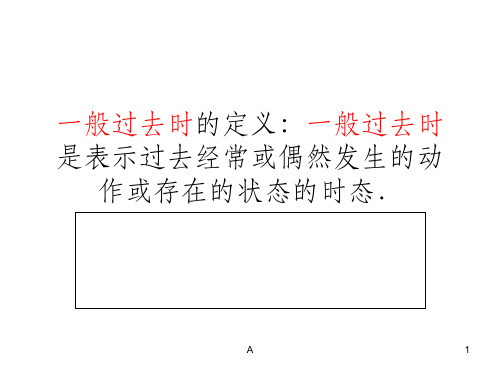
作或存在的状态的时态.
A
1
• 一般过去时用动词的过去式,动词的过去 式一般都加ed,如work worked.结尾是e 的只加d,如like liked.末尾只有一个辅音字 母的重读闭音节要双写这个字母再加ed,如 stop stopped,以辅音字母加y结尾的,先 变y为i再加ed,如study studied.
A
4
• 一般过去时有什么句型构成
• 1。 情态动词变过去 can-could / will-would / may-might / shall-should
• 2。 BE动词变过去 am-was / are-were / is-was /
• 3。 实义动词变过去 go-went / do-did / see-saw / talk-talked /
•
否定句:
ห้องสมุดไป่ตู้
______________________________________
____
•
一般疑问句:
______________________________________
__
•
对划线部分提问:
____________________________________
A
6
• 1. My mother ________________ (not do) housework yesterday.
• eg: I am a student. I was a student.
• Mary goes to school at seven. Mary went to school at seven.
一般过去时

三.一般过去时(simple past tense)1.概念一般过去时表示过去某一时刻,某一段时间发生的动作或存在的状态。
一般过去时用动词的过去式表示。
2.构成一般过去时用动词的过去式表示。
be的过去式有was,were两种; have 的过去式是had;规则动词的过去式在动词词尾加-ed,具体构成规则如下:1)一般情况,动词后加ed,例词work-worked,clean-cleaned,play-played,wash-washed2)以不发音的e结尾,-d,例词live-lived,move-moved,hope-hoped,arrive-arrived 3)以辅音字母+y结尾,变y为 i再加-ed,例词study-studied,carry-carried,cry-cried,identify-identified 4)以辅音字母结尾的重读闭音节,双写最后一个辅音字母加-ed,例词plan-plannedstop-stopped,beg-begged,grab-grabbed 3.用法 (1) 表示发生在过去的动作或存在的状态。
如:He went shopping with his friends last week.They arrived ten minutes ago.He became a hotel manager ten years ago.Did you go to the concert last night?(2) 表示在过去经常发生的动作或习惯动作。
如:He visited his grandparents once a month last year.She usually went to work by car last year.When I was at school, I always went to school by bus.4.如何识别一般过去时常见的标志词有:1). yesterday, the day before yesterday.2). last week / year / month / term …(简称last系列)3). two hours ago, three years ago, a moment ago…(简称ago系列)4). in / on + 过去的年/月/日,如 in 1999, on April, 20055). just now, once upon a time, one day…5.易错点例析:(1)——Your phone number again? I _________ quite catch it.——It’s 4331577A. didn’tB. couldn’tC. don’tD. can’t(2)——Mr. Smith isn’t coming tonight.——But he _________.A. promisesB. promisedC. will promiseD. had promised(3) ——Hey, look where you are going!——Oh, I’m terribly sorry. _________.A. I’m not noticingB. I wasn’t noticingC. I haven’t noticedD. I don’t notice(4) ——Oh it’s you ! I _________ you.——I’ve had my hai r cut.A. didn’t realizeB. haven’t realizedC. didn’t recognizeD. don’t recognized(5) ——Since you’ve agreed to go, why aren’t you getting ready?——But I _________ that you would have me start at once.A. don’t realizeB. didn’t realizeC. hadn’t realizedD. haven’t realized(6) ——It’s twelve o’clock, I think I must be off now.——Oh, really? I _________ it at all.A. don’t realizeB. haven’t realizedC. didn’t realizeD. hadn’t realizedKey:ABBCBC6.中考真题及模拟(2009朝阳区一模)He went into his room, _______ the light and began to work.A. has turned onB. will turn onC. turns onD. turned on(2009海淀一模)——What’s the best food have you had in Beijing, Alex?——Roast duck! I _________to a famous restaurant to have it last week.A. have goneB. goC. will goD. went(2009宣武区一模)——Do you know how many gold medals the 23-year-old Michael Phelps _____________at the 2008 Summer Olympic Games?——Eight.A. winB. winsC. wonD. has won(2008北京)We were in Qingdao last week and __________ great fun there.A. will haveB. have hadC. hadD. have(2007北京)——What did you do after school yesterday?——I _________basketball with my friends.A. playB. playedC. will playD. am playing(2005北京)---Hi, Kate. You look tired. What’s the matter?---I ______well last night.A. didn’t sleepB. don’t sleepC. haven’t sleptD. won’t sleep (2008四川泸州)Yesterday,Tony’s family _________ a good time.A. hasB. haveC. had(2007湖南湘潭)I’m sorry you’ve missed the train. It _______10 minutes ago.A. leftB. has leftC. had left(2007福州)——Mr Green, __________you________ Three Lanes and Alleys(三坊七巷)last Sunday?——No, but I’ll visit them next week.A. will; go toB. have; been toC. did; go toD. have; gone to (2007浙江)——What did the teacher say just now?——He __________us not to play computer games all day.A. tellsB. toldC. has toldD. is told(2007江西)——Inventors have changed the way we live.——So they are famous for the great things they _________.A. doB. didC. are doingD. had done(06江西)——Where’s the cake I made this morning?——We _______ it, mum. Can you make another one for us?A. ateB. eatC. will itD. were eating。
英语时态:一般过去时
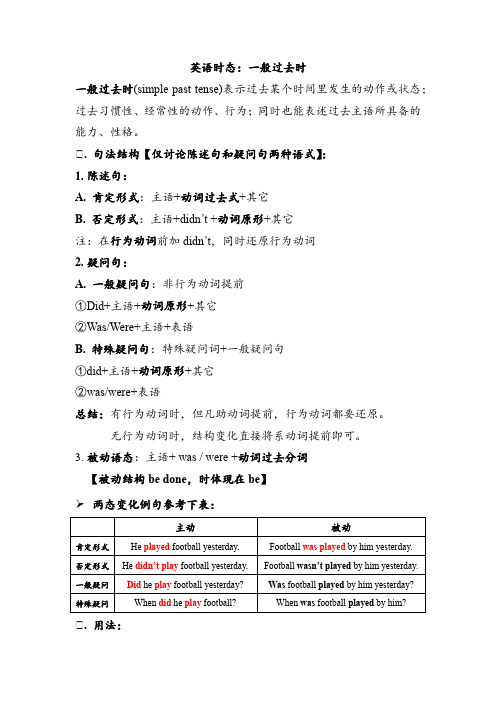
英语时态:一般过去时一般过去时(simple past tense)表示过去某个时间里发生的动作或状态;过去习惯性、经常性的动作、行为;同时也能表述过去主语所具备的能力、性格。
Ⅰ. 句法结构【仅讨论陈述句和疑问句两种语式】:1.陈述句:A. 肯定形式:主语+动词过去式+其它B. 否定形式:主语+didn’t +动词原形+其它注:在行为动词前加didn’t,同时还原行为动词2.疑问句:A. 一般疑问句:非行为动词提前①Did+主语+动词原形+其它②Was/Were+主语+表语B. 特殊疑问句:特殊疑问词+一般疑问句①did+主语+动词原形+其它②was/were+表语总结:有行为动词时,但凡助动词提前,行为动词都要还原。
无行为动词时,结构变化直接将系动词提前即可。
3.被动语态:主语+ was / were +动词过去分词【被动结构be done,时体现在be】➢两态变化例句参考下表:Ⅰ. 用法:1.一般过去时表示在过去某个特定时间发生,也可以表示过去习惯性、经常性的动作。
(一般不强调动作的影响,只说明的事情。
)I talked with Catherine yesterday morning.His mother cooked him breakfast.2.一般过去时常与表示过去的时间状语或从句连用,如:yesterday, last week, in the past, in 1993, at that time, once, during the war, before, a few days ago, when 等。
3.表示过去连续发生的动作时,要用过去时。
这种情况下,往往没有表示过去的时间状语,而通过上下文来表示。
The boy cried for a while,and then drank a cup of tea.4.表示在此之前一段时间内经常或反复的动作。
常与always,never 等连用。
一般过去时知识点
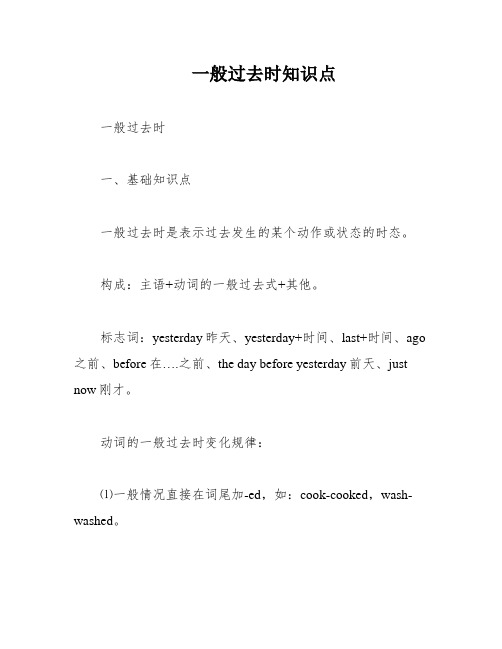
一般过去时知识点一般过去时一、基础知识点一般过去时是表示过去发生的某个动作或状态的时态。
构成:主语+动词的一般过去式+其他。
标志词:yesterday昨天、yesterday+时间、last+时间、ago 之前、before在….之前、the day before yesterday前天、just now刚才。
动词的一般过去时变化规律:⑴一般情况直接在词尾加-ed,如:cook-cooked,wash-washed。
⑵以不发音的e结尾的动词,在词尾+d,如:like-liked,live-lived。
⑶以重读闭音节结尾的动词,双写最后一个字母再在词尾+ed,如:ped,shop-shopped,plan-planned。
⑷以辅音字母+y结尾的动词,要改y为i再加ed,如:study-studied,carry-carried。
另外,还需记住不规则动词的一般过去时变形。
二、做题步骤:⑴先找到句子中表示一般过去时的标志词。
⑵确定句子的动词是用be动词还是行为动词。
Be动词的过去时练一、用be动词的适当形式填空1.I was at school just now.2.He was in Beijing on n last week.3.We were students two years ago.4.They were on the farm a moment ago. 5.Yang Ling was eleven years old last year. 6.There was an apple on the plate yesterday. 7.There was some milk in the fridge on Sunday.二、用行为动词的适当形式填空1.He lived in Wuxi two years ago.2.The cat ate a bird last night.3.We had a party last Halloween.4.Nancy picked up oranges on the farm last week。
一般过去时定义,结构,标志词,用法

一般过去时定义,结构,标志词,用法一般过去时是英语中最基本的过去时态之一,它用于描述过去发生的动作或状态。
本文将介绍一般过去时的定义、结构、标志词和用法。
一、定义一般过去时是指发生在过去的动作或状态,不考虑其持续时间或是否已经完成。
它用于描述已经结束的事情,通常与表示过去的时间短语一起使用。
二、结构一般过去时的结构很简单,主要由动词的过去式构成。
对于大多数动词,过去式是在动词原形后加上-ed,如walked,talked,played 等。
但是,有一些动词的过去式是不规则的,需要记忆,如go的过去式是went,eat的过去式是ate等。
另外,一般过去时的肯定句结构为:主语 + 动词过去式 + 其他。
如:I walked to the park yesterday.(我昨天走到了公园。
)否定句的结构为:主语 + did not + 动词原形 + 其他。
如:I did not walk to the park yesterday.(我昨天没有走到公园。
)疑问句的结构为:Did + 主语 + 动词原形 + 其他?如:Did you walk to the park yesterday?(你昨天走到了公园吗?)三、标志词一般过去时的标志词有很多,其中最常见的有以下几种:1. 表示过去的时间短语,如yesterday(昨天)、last week(上个星期)、in 1999(在1999年)等。
2. 过去式的动词,如walked(走)、talked(谈话)、played(玩)等。
3. 过去式的助动词did,如did not(没做)、did you(你做了吗?)等。
四、用法一般过去时通常用于以下情况:1. 描述过去的事件或状态,如:I went to the park yesterday.(我昨天去了公园。
)2. 描述过去的习惯或经常性动作,如:When I was a child, I played with dolls every day.(我小时候每天都和玩偶玩。
一般过去时知识点
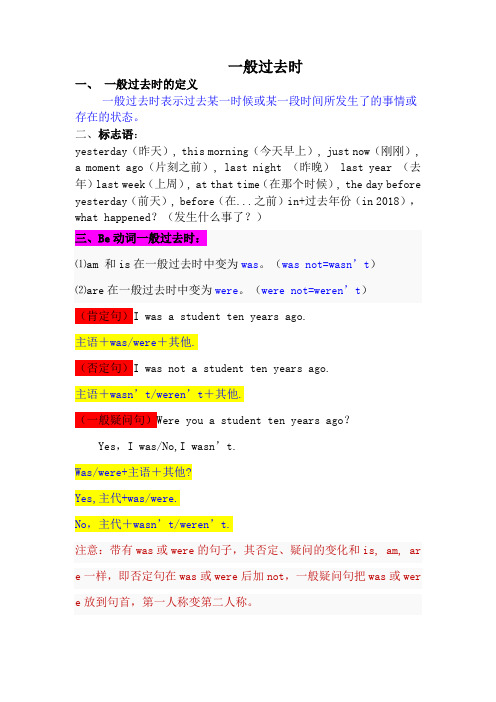
一般过去时一、一般过去时的定义一般过去时表示过去某一时候或某一段时间所发生了的事情或存在的状态。
二、标志语:yesterday(昨天), this morning(今天早上), just now(刚刚), a moment ago(片刻之前), last night (昨晚) last year (去年)last week(上周), at that time(在那个时候), the day before yesterday(前天), before(在...之前)in+过去年份(in 2018),what happened?(发生什么事了?)三、Be动词一般过去时:⑴am 和is在一般过去时中变为was。
(was not=wasn’t)⑵are在一般过去时中变为were。
(were not=weren’t)(肯定句)I was a student ten years ago.主语+was/were+其他.(否定句)I was not a student ten years ago.主语+wasn’t/weren’t+其他.(一般疑问句)Were you a student ten years ago?Yes,I was/No,I wasn’t.Was/were+主语+其他?Yes,主代+was/were.No,主代+wasn’t/weren’t.注意:带有was或were的句子,其否定、疑问的变化和is, am, ar e一样,即否定句在was或were后加not,一般疑问句把was或wer e放到句首,第一人称变第二人称。
(特殊疑问句)1.对I提问:Who was a student ten years ago?(Who作为主语时,谓语动词用三单)四、实义动词一般过去时:(肯定句)I walked to school yesterday.主语+动词过去式+其他.(否定句)I didn’t walk to school yesterday.主语+didn’t + 动词原形+其他.否定句变化规则:1、找be动词2、若无be动词,找情态动词(could)3、若无情态动词,请助动词(did)来帮助4、did放于主语的后面,动词的前面,加上not,did not= didn't5、动词变原形6、some->any and->or too->either(一般疑问句)Did you walk to school yesterday?Yes,I did. No,I didn’t.Did +主语+动词原形+其他?Yes,主代+did.No,主代+didn’t.一般疑问句变化规则:1、找be动词2、若无be动词,找情态动词(could)3、若无情态动词,请助动词(did)来帮助4、did放于开头,首字母大写5、第一人称变第二人称6、动词变原形7、some->any and->or too不变either(特殊疑问句)I went to school on foot yesterday.1.对I 提问:Who went to school on foot yesterday?2.对went to school 提问:What did you do on foot yesterday?3.对school 提问:Where did you go on foot yesterday?4.对on foot 提问:How did you go to school yesterday?5.对yesterday提问:When did you go to school on foot?动词变化规则:1、直接在动词后面加ed。
一般过去时

(1)基本用法1. 一般过去时通常用来表示过去某个时间里发生的动作、存在的状况或者过去习惯性、经常性的动作、行为等等。
如:--- Where were you last week 上周你在哪儿--- I was at my uncle's home in the countryside. (上周)我在乡下的叔叔家。
2. 有些情况,发生时间没有明确标明,但实际上是过去发生的,应用过去时态;另外,在谈到已故去的人时,也多用过去时。
如:He bought a cat, and now they are good friends. 他买了一只猫,现在他们是好朋友了。
Lu Xun was a great writer. 鲁迅是一位伟大的作家。
(2)句法结构1、肯定形式主语+动词过去式+其他例句:She often came to help us in those days.2、否定形式①was/were+not;②在行为动词前加didn't,同时还原行为动词例句:I didn't know you like coffee.3、一般疑问句①Did+主语+谓语动词原型+其他②Was\Were+主语+表语例句:Did I do homework?4、口诀一般过去时并不难,过去动作、状态记心间。
动词要用过去式,时间状语句末站。
否定句很简单,didn't 站在动原前,其它部分不要变。
一般疑问句也好变,did放在句子前,主语、动原、其它部分依次站立。
特殊疑问句也简单,疑问词加一般疑问句记心间。
最后一条请注意,动词过去式要牢记!(3)时间状语与一般过去时连用的时间状语有:yesterday(昨天), last night(昨晚), last week (上个星期), four days ago(四天前), in 2002(在2002年), just now(刚才), the daybefore yesterday(前天)等。
一般过去时

6. My mother __d_id_n_'_t_d_o___(not do) housework
yesterday. 7. There _w__e_r_e_n_o_t_/_w_e_r_e_n_'t__(be not) any hospitals in my hometown(家乡) in 1940. 8. There _w__a_s_(be) a football match on TV yesterday evening, but I _h__a_d_(have) no time to watch it. 9. The sun _g_o_e_s_(go) up in the east and _s_e_t_s_(set)
3.一般疑问句:Be动词 / Did+主语+动词原形+其 他?
如:Were you in school last Friday? Did your mother cook dinner last night? Did you wash your clothes last Sunday?
4.特殊疑问句:特殊疑问词+一般疑问句? 如:I was at home yesterday. → Where were you yesterday?
六、用所给单词的适当形式填空。 It 1.___w_a_s__ (be) sunny last weekend. I 2. __w__e_n_t _(go) to the park with my friends. There 3. ___a_r_e__(be) many trees, a lake and some mountains in the park. We 4. _p__la_y_e_d_(play)games and 5. _cl_im__b_e_d_(climb) a mountain. We 6. __h_a_d___(have) a lot of fun. How happy we 7.__w__e_re__ (be)!
一般过去式的结构,用法,含义及标志性时间状语

一般过去式的结构,用法,含义及标志性时间状语【精选】一、一般过去时的基本结构:1、肯定句“主语+动词过去式+其他”或者“主语+was/were +其他”。
【举例】 I played tennis last weekend. 我上周末打网球了。
My school trip was great. 我的学校郊游棒极了。
2、否定句“主语+didn’t+动词原形+其他”或“主语+wasn’t/weren’t+其他”。
【举例】 The girl didn’t play computer games yesterday afternoon.这个女孩昨天下午没玩电子游戏。
Old Henry wasn’t happy last Friday. 上星期五老亨利不高兴。
3、一般疑问句“Did+主语+动词原形+其他?”肯定回答为“Yes,主语+did”。
否定回答为“No,主语+didn’t”或者“Was/Were+主语+其他?”肯定回答为“Yes,主语+was/were”。
否定回答为“No,主语+wasn’t/weren’t”。
【举例】— Did you go to the beach? 你们去海滩了吗?— Yes, we did./No, we didn’t. 是的,我们去了。
/不,我们没有。
— Was your weekend OK? 你的周末过得还行吧?— Yes, it was./No, it wasn’t. 是的,还行。
/不,不行。
4、特殊疑问句:特殊疑问词+一般疑问句(顺序)?【举例】— What did Li Lei do last weekend? 李雷上周末干什么了?— He visited his grandparents. 他去看了他的祖父母。
— Where were you yesterday? 你昨天在哪儿?— I was at home. 我在家里。
二、一般过去时的基本用法:一般过去时表示过去某个时间发生的动作或存在的状态,也可表示过去经常或反复发生的动作。
一般过去时详解

基本概念一般过去时(simple past tense)表示过去某个时间里发生的动作或存在的状态,常和表示过去的时间状语连用,如:yesterday,last night,in 1990,two days ago 等。
一般过去时也表示过去经常或反复发生的动作,常和often,always等表式频率的时间状语连用。
过去习惯性、经常性的动作、行为;过去主语所具备的能力和性格。
时间状语Ago(two hours ago(一段时间+ago),yesterday(句子开头或结尾),the day before yesterday,last week,last(year,night,month…),具体时间(如Jan.fourth),just now,at the age of,one day,long ago,once upon a time,and so on,this morning.long long ago(很久以前)。
1.直接加ed:work—— worked look——looked play——played,2.以不发音e结尾的单词,直接加d:live ——lived hope——hoped use——used,3 以辅音字母+y结尾的,变y为i加ed:study—— studied carry——carried worry——worried,4以元音字母+y结尾的,直接加ed:enjoy ——enjoyed play——played5 以重读闭音节结尾的,双写最后的辅音字母+ed:stop——stopped plan——planned不规则变化的动词过去式:have---had are---were get---got say---said feel---felt do/does---didis---was基本结构主语+动词过去式+其他否定形式:①was/were+not;②在行为动词前加didn't,同时还原行为动词一般疑问句①Did+主语+do+其他?②Was\Were+主语+ do sth例句:She often came to help us in those days.I didn't know you are so busy.特殊疑问句疑问词+did+主语+动词原形+其他一般过去式的构成形式肯定式疑问式否定式疑问否定式I worked Did I work?I did not work Did I not work?He(she,it) worked Did he(she,it) work? He (she,it)did not work Did he(she,it)not work? We worked Did we work? We did not work Did we not work?You worked Did you work? You did not work Did you not work? They worked Did they work? They did not work Did they not work?用法(1)一般过去时表示在过去某个特定时间发生,也可以表示过去习惯性、经常性的动作。
一般过去时的知识点归纳
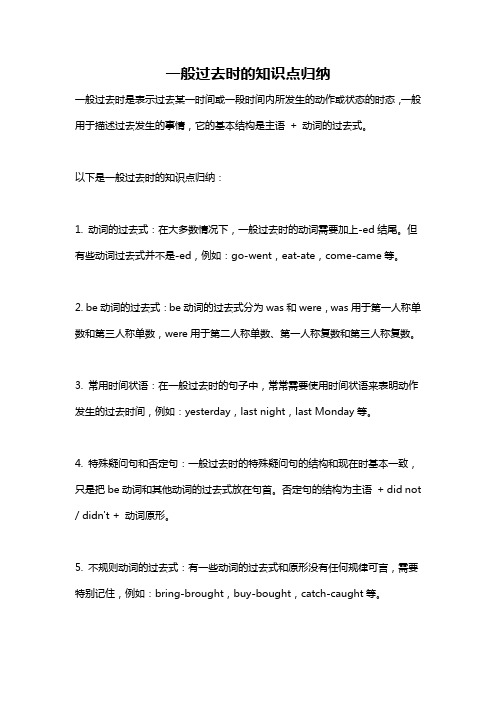
一般过去时的知识点归纳一般过去时是表示过去某一时间或一段时间内所发生的动作或状态的时态,一般用于描述过去发生的事情,它的基本结构是主语+ 动词的过去式。
以下是一般过去时的知识点归纳:1. 动词的过去式:在大多数情况下,一般过去时的动词需要加上-ed结尾。
但有些动词过去式并不是-ed,例如:go-went,eat-ate,come-came等。
2. be动词的过去式:be动词的过去式分为was和were,was用于第一人称单数和第三人称单数,were用于第二人称单数、第一人称复数和第三人称复数。
3. 常用时间状语:在一般过去时的句子中,常常需要使用时间状语来表明动作发生的过去时间,例如:yesterday,last night,last Monday等。
4. 特殊疑问句和否定句:一般过去时的特殊疑问句的结构和现在时基本一致,只是把be动词和其他动词的过去式放在句首。
否定句的结构为主语+ did not / didn't + 动词原形。
5. 不规则动词的过去式:有一些动词的过去式和原形没有任何规律可言,需要特别记住,例如:bring-brought,buy-bought,catch-caught等。
6. 短语动词的过去式:短语动词的过去式一般是由动词原形和前缀或后缀组成,例如:give up-gave up,look for-looked for,break down-broke down等。
7. 时态转换:如果句子中已经使用了过去式的时间状语,那么主语动词不必再使用过去式,而可以使用现在完成式或过去完成式等。
8. 多重动作的描述:当一句话中有多个动作需要被描述时,需要注意动作发生的先后顺序和时态的运用,通常需要使用时间状语、连接词或使用逗号分开多个动作。
一般过去时

(一)一般过去时的定义一般过去时表示:过去经常反复发生的动作或存在的状态。
例:He is a teacher now. He was a doctor two month ago.(二)一般过去时的构成: 一般过去时用动词的过去式。
动词过去式的构成有规则变化和不规则变化两种。
1. 动词过去式的规则变化1) 一般情况下动词后面直接加ed, 如:work– worked want – wanted 2) 以字母e 结尾的动词,直接加d, 如:live—lived like– liked 3) 以辅音字母加y结尾的单词,变y为i加―ed‖如:cry—cried study – studied 4)重读闭音节结尾的动词,双写词尾字母再加ed. 如:Hop—hopped2. 无规则变化的动词需要特殊记忆如:do----did /see---saw / sleep---slept / make---made/ run---ran / buy---bought/go---went /sit---sat /take---took /give---gave/ eat---ate /have---had/ speak---spoke/ ride—rode /break—broke/ am/is---was / are---were /(三)常用时间状语in 1989, yesterday,last Sunday / month / week / year this week/ month/ year a week agoTwo weeks ago the week before last the year before last练习:1. Y esterday, I ___(do) a puzzle.(拼图)2Alice _____(go ) to see her grandma last week.3. What ____(do) you do yesterday?4. She ____ (walk) in the park last year.5. In 1997, she ____(be) a small child.6. What _____(do) he do yesterday afternoon?以辅音字母结尾,重读部分在后面的音节。
一般过去时的定义

01
02
03
基本形式
动词的过去式,通常是在 动词后面加-ed。例如: work → worked。
规则变化
大部分动词的过去式都有 规则变化,即直接在动词 后面加-ed。例如:play → played。
不规则变化
有些动词的过去式有不规 则变化,需要特别记忆。 例如:go → went。
一般过去时与现在时的区别
一般过去时则强调动作的完成性,通常与时间状语连用, 例如“He read a book last night”(他昨晚读了一本 书)。
一般过去时与过去完成时的比较
定义 过去完成时表示在过去的某个时间之前已经完成的动作或状态。
一般过去时表示在过去的某个时间点发生的动作或状态。
一般过去时与过去完成时的比较
时间点不同
表达方式不同
一般过去时表示过去某个时间点发生 的动作或状态,而现在时表示现在正 在进行的动作或状态。
一般过去时通常与表示过去的连词或 副词(如yesterday、last week)一 起使用,而现在时不需要这些连词或 副词。
语境不同
使用一般过去时通常是为了描述过去 发生的事情,提供背景信息或者对比 现在的情况;而现在时则强调当前的 情况或正在进行的动作。
一般过去时通常用于描述纯粹发生在过去的动作或状态, 例如“I saw the movie last night”(我昨晚看了这部 电影)。
一般过去时与过去进行时的比较
定义
过去进行时表示在过去某一时刻正在进行的动作。
一般过去时表示过去的某个时间点发生的动作或状态。
用法
过去进行时强调动作的持续性,通常与时间状语连用,例 如“He was reading a book at 9 o'clock yesterday” (他昨天9点正在读书)。
一般过去时
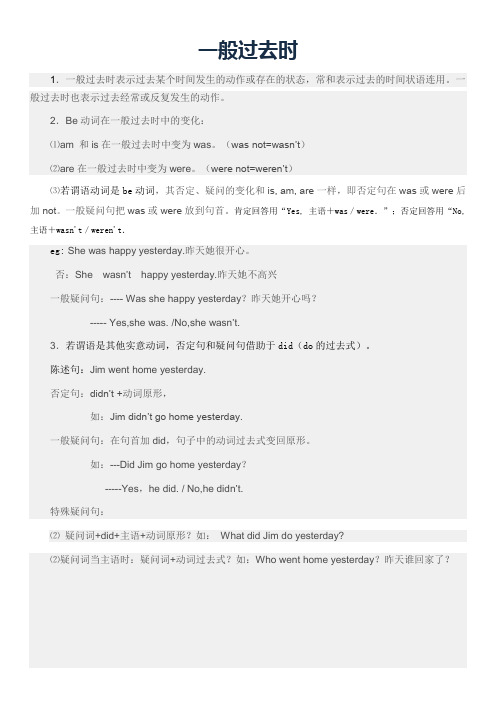
一般过去时1.一般过去时表示过去某个时间发生的动作或存在的状态,常和表示过去的时间状语连用。
一般过去时也表示过去经常或反复发生的动作。
2.Be动词在一般过去时中的变化:⑴am 和is在一般过去时中变为was。
(was not=wasn’t)⑵are在一般过去时中变为were。
(were not=weren’t)⑶若谓语动词是be动词,其否定、疑问的变化和is, am, are一样,即否定句在was或were后加not。
一般疑问句把was或were放到句首。
肯定回答用“Yes, 主语+was/were.”;否定回答用“No,主语+wasn't/weren't.eg:She was happy yesterday.昨天她很开心。
否:She wasn’t happy yesterday.昨天她不高兴一般疑问句:---- Was shehappy yesterday?昨天她开心吗?-----Yes,she was. /No,she wasn’t.3.若谓语是其他实意动词,否定句和疑问句借助于did(do的过去式)。
陈述句:Jim went home yesterday.否定句:didn’t +动词原形,如:Jim didn’t go home yesterday.一般疑问句:在句首加did,句子中的动词过去式变回原形。
如:---Did Jim go home yesterday?-----Yes,he did. / No,he didn’t.特殊疑问句:⑵疑问词+did+主语+动词原形?如:What did Jim do yesterday?⑵疑问词当主语时:疑问词+动词过去式?如:Who went home yesterday?昨天谁回家了?动词过去式变化规则:1.一般在动词末尾加-ed,如:cook-cooked talk—talked play-played2.结尾是e加d,如:taste-tasted品尝drive—drived驾驶change—changed改变3.末尾只有一个元音字母和一个辅音字母的重读闭音节,应双写末尾的辅音字母,再加-ed,如:stop-stopped4.以“辅音字母+y”结尾的,变y为i,再加-ed,如:study-studied5.不规则动词过去式:am,is-was are-were, do-did, see-saw, say-saidgive-gave, get- got, go-went, come-came, have-had,eat-ate, take-took, run-ran, sing-sang, put-put,make-made, read-read, write-wrote, draw-drew, drink-drank,fly-flew, ride-rode, speak-spoke, sweep-swept, buy-boughtswim-swam, sit-sat bring--brought can-could cut-cutbecome-became begin-began draw-drew feel-felt find-foundforget-forgot hear-heard keep-kept know-knewlearn-learnt (learned) leave-left let-let lose-lostmeet-met read-read sleep-slept speak-spoke take-tookteach-taught tell-told write-wrote wake-woke think-though一,过去时练习:写出下列动词的过去式is\am______ fly______ plant________ are_______ drink_____play_______ go______ make ________ does_________ dance________worry________ ask _____ taste_________ eat__________ draw________put ______ throw________ kick_________ pass_______ do ________二、用be动词的适当形式填空。
一般过去时的知识点归纳

一般过去时的知识点归纳一般过去时知识点归纳一、一般过去时的定义一般过去时(Simple Past Tense)用于描述在过去某个具体时间发生的动作或存在的状态,以及过去经常或反复发生的动作。
二、一般过去时的构成1. 规则动词:一般在动词原形后加-ed。
- 例:worked, played, visited2. 不规则动词:需记忆其过去式形式。
- 例:went, saw, ate三、一般过去时的用法1. 描述过去具体时间发生的动作或状态。
- 例:He walked to school yesterday.2. 表示过去经常或反复发生的动作。
- 例:When I was a child, I often played football after school.3. 用于时间、条件状语从句中,表示过去将来的动作。
- 例:I said I would call her when I got home.四、一般过去时的标志词1. 具体的时间状语:yesterday, last week, in 1990等。
2. 过去的时间状语:a moment ago, just now, the other day等。
3. 频率副词:never, seldom, sometimes, often, usually等。
五、不规则动词的过去式变化1. 改变元音字母:sing-sang, swim-swam2. 改变辅音字母:begin-began, run-ran3. 完全不规则变化:go-went, come-came, eat-ate六、一般过去时与现在完成时的区别1. 一般过去时强调过去某个时间点发生的具体动作,而现在完成时强调过去发生的动作对现在的影响或结果。
- 例:I visited the museum last week. (强调上周的动作)- 例:I have visited the museum before. (强调现在对博物馆的了解)七、一般过去时的否定句和疑问句1. 否定句:在动词前加did not (didn't)。
一般过去时的知识点归纳
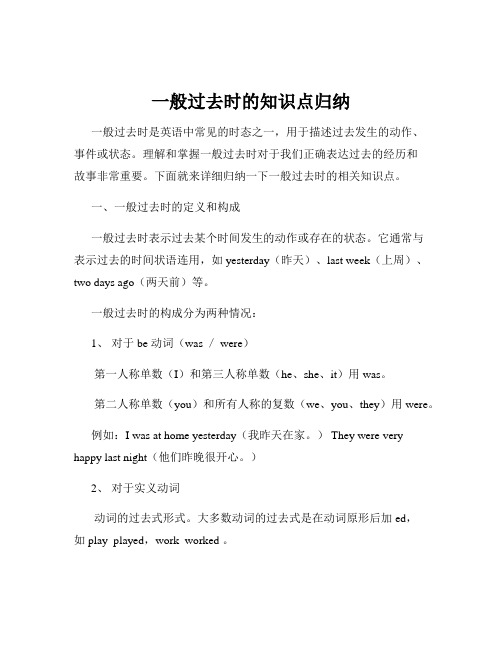
一般过去时的知识点归纳一般过去时是英语中常见的时态之一,用于描述过去发生的动作、事件或状态。
理解和掌握一般过去时对于我们正确表达过去的经历和故事非常重要。
下面就来详细归纳一下一般过去时的相关知识点。
一、一般过去时的定义和构成一般过去时表示过去某个时间发生的动作或存在的状态。
它通常与表示过去的时间状语连用,如 yesterday(昨天)、last week(上周)、two days ago(两天前)等。
一般过去时的构成分为两种情况:1、对于 be 动词(was / were)第一人称单数(I)和第三人称单数(he、she、it)用 was。
第二人称单数(you)和所有人称的复数(we、you、they)用 were。
例如:I was at home yesterday(我昨天在家。
) They were very happy last night(他们昨晚很开心。
)2、对于实义动词动词的过去式形式。
大多数动词的过去式是在动词原形后加 ed,如 play played,work worked 。
但也有一些不规则动词,它们的过去式需要特殊记忆,比如 go went,have had ,do did 等。
例如:He played football last weekend(他上周末踢足球了。
) She had a big party last month(她上个月举办了一个大型聚会。
)二、一般过去时的用法1、表示过去某个特定时间发生的动作或存在的状态。
例如:I met him in the street yesterday(昨天我在街上遇见了他。
)2、表示过去经常或反复发生的动作。
例如:He often went swimming when he was a child(他小时候经常去游泳。
)3、在时间、条件状语从句中,表示过去将来的动作。
例如:She said she would come if she had time(她说如果有时间她会来。
一般过去时知识点总结
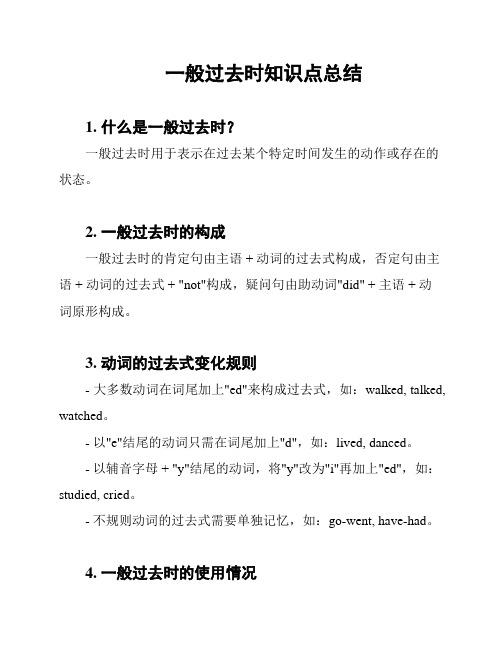
一般过去时知识点总结1. 什么是一般过去时?一般过去时用于表示在过去某个特定时间发生的动作或存在的状态。
2. 一般过去时的构成一般过去时的肯定句由主语 + 动词的过去式构成,否定句由主语 + 动词的过去式 + "not"构成,疑问句由助动词"did" + 主语 + 动词原形构成。
3. 动词的过去式变化规则- 大多数动词在词尾加上"ed"来构成过去式,如:walked, talked, watched。
- 以"e"结尾的动词只需在词尾加上"d",如:lived, danced。
- 以辅音字母 + "y"结尾的动词,将"y"改为"i"再加上"ed",如:studied, cried。
- 不规则动词的过去式需要单独记忆,如:go-went, have-had。
4. 一般过去时的使用情况- 表示过去的常态或惯性动作,如:She always drank coffee in the morning.- 表示过去发生的事情,如:I saw him at the party yesterday.- 在时间状语从句中,如:I visited my grandparents when I was on vacation.5. 一般过去时的时间状语在一般过去时中,常用的时间状语词包括:yesterday, last week, two days ago, in 1999,等等。
6. 注意事项- 一般过去时只用于过去的时间点或时间段,不能用于现在或将来。
- 一般过去时的动作或状态在过去发生,与现在没有直接的联系。
以上是关于一般过去时的知识点总结,希望对你有所帮助!。
一般过去时

2.动词过去式变化的一般规则
以-e结尾的动词,直接加-d
e.g.: believe---believed waste---wasted shave---shaved live---lived
2.动词过去式变化的一般规则
③ 以重读闭音节结尾并且词尾只有一个辅音 字母的单词,要双写最后一个辅音字母再 加-ed
一般过去时的时间状语
e.g.: She emptied the box ten minutes ago. 十分钟前,她把盒子里的东西倒了出 去。 He went shopping yesterday. 他昨天去逛街了。 His father lived in Russia 2 years ago.两年前他爸爸住在俄罗斯。
e.g.: stop---stopped fit---fitted regret---regretted
2.动词过去式变化的一般规则
④ 以辅音字母加y结尾的动词,把y变成i再 加-ed
e.g.: study---studied empty---emptied cry---criedBiblioteka 2.动词过去式变化的一般规则
2.动词过去式变化的一般规则。
一般的动词后面直接加-ed e.g.: work---worked jump---jumped cook---cooked clean—cleaned (读音规律:清音后面读清音,浊音后面读浊 音,/t/、/d/后面读【id】 e.g.: dust---dusted
一般过去时的时间状语
动词一般过去时的疑问句要借助did,但后 面的动词要变成原型。 e.g.: He made a desk for his son yesterday. Did he make a desk for his son yesterday? Yes, he did. No, he didn’t.
一般过去时知识点梳理总结

一般过去时知识点梳理总结一、一般过去时含义:表示动作发生在过去二、一般过去时的时间标志词:yesterday(昨天)、the day before yesterday(前天)、just now(刚刚)、this morning(今天早上)、in 2002(在2002年) ...ago(...之前):three days ago(三天前)、two weeks ago(两年前) last...(上一个...):last week(上一周),last month(上个月)in the past(在过去)三、一般过去时的句型:1.be动词(am的过去式:was;is的过去式:was are的过去式:were)1)肯定句:主语+be动词过去式...如:He was a teacher.他以前是一个老师。
They were teachers.他们以前是老师。
2)否定句:主语+be动词过去式+not...如:He wasn’t a teacher..他以前不是一个老师。
They weren’t teachers.他们以前不是老师。
3)一般疑问句:be动词过去式+主语...如:Was he a teacher?他以前是一个老师吗?Were they teachers?他们以前是老师吗?肯定回答:Yes,主语+be动词过去式。
如:Yes,he was.Yes,they were.否定回答:No,主语+be动词过去式+not.如:No,he wasn’t.No,they weren’t.3)特殊疑问句:特殊疑问词+be动词过去式+主语...如:What was he?他以前是干什么的?What were they?他们以前是干什么的?2.实义动词实义动词的否定句、疑问句需要借助助动词,(助动词do/does的过去式是did)1)肯定句:主语+动词过去式...如:I went to school yesterday.我昨天去学校了。
- 1、下载文档前请自行甄别文档内容的完整性,平台不提供额外的编辑、内容补充、找答案等附加服务。
- 2、"仅部分预览"的文档,不可在线预览部分如存在完整性等问题,可反馈申请退款(可完整预览的文档不适用该条件!)。
- 3、如文档侵犯您的权益,请联系客服反馈,我们会尽快为您处理(人工客服工作时间:9:00-18:30)。
1.Tom and Mary ___________ (come) to China last month.2.Mike _________________(not go) to bed until 12 o’clock last night. So I _______ (get ) up late.3.Mary __________ (read) English yesterday morning.4.There _________ (be) no one here a moment ago.5.I ___________ (call) Mike this morning.6.I listened but ___________ (hear) nothing.7.Tom ___________ (begin) to learn Chinese last year.st week we _________ (pick) many apples on the farm.9.My mother ________________ (not do) housework yesterday.10.She watches TV every evening. But she _______________ (not watch) TV last night. 11.________ your father ________ ( go ) to work every day last year?12. —What time _______ you _______ (get) to Beijing yesterday? —We __________ (get) to Beijing at 9:00 in the evening.13.What __________ (make) him cry (哭) just now?st year the teacher ___________ (tell) us that the earth moves around the sun.15.There ____________ a telephone call for you just now. (be)16.There __________ not enough people to pick apples that day. ( be)17.There _____________ any hospitals (医院) in my hometown (家乡) in 1940. ( be not)18.There ____________ enough milk at home last week, wasn’t there?19.Eli ____________ to Japan last week. ( move)20. –When _______ you _________ (come) to China? - Last year.21.Did she ________ (have) supper at home?22.Jack ____________ (not clean) the room just now.23._________ (be) it cold in your city yesterday?24.How many people ________ (be) there in your class last term?25.It ________ (be) hot yesterday and most children _______ (be) outside.26. There ________ (be) a football match on TV yesterday evening, but I _________ (have) no time to watch it.27. He ate some bread and _________ (drink) some milk.28. ________ he __________ (finish) his homework last night?29. I__________(be) tired yesterday.30. I ___________(gain ) Arts degree last year.31. What _________ you ___________ (do) last night?32. My grandfather _________ (leave) Hong Kong for New York in 1998.33. What _______ he ________ (do) yesterday?34. Last week I _______ (buy) a new bike.35. He ________ (be) here just now.36. He __________ (not find ) his key last night.37. My father __________ (drink) a lot of wine yesterday.38. ________ you ________ (finish) your homework yesterday?39. I ________ (eat) some eggs and bread this morning.40. Her mother __________ (not give) the girl any present.二、改错题1.How is Jane yesterday? _____________________2.He go to school by bus last week. ____________________________3.He often goes home at 6:00 last month. ____________________________4.I can fly kites seven years ago. ______________________________5.Did you saw him just now. ____________________________________ 6.Tom wasn’t watch TV last night.____________________________________ 7.I didn’t my homework yesterday. ____________________________________ 8.He wait for you three hours ago. ____________________________________ 9.Who find it just now ? ________________________________________三、按要求变换句型。
1. Father bought me a new bike. (同义句)Father bought _______ _______ ________ ________ me.2. Frank read an interesting book about history. (一般疑问句)_______ Frank _______ an interesting book about history?3. He’s cleaning his rooms. (划线提问)________ he _______?4. Why not go out for a walk? (同义句)_______ ________ ________ out for a walk?5. Thomas spent RMB 10 on this book. (否定句)Thomas _______ _______ RMB 10 on this book.6. My family went to the beach last week. (划线提问)________ ________ ________ family _______ last week?7. I didn’t have any friends. (一般疑问句)________ _______ have _______ friends?8. I think she is Lily’s sister. (否定句)____________________9. Sally often does some reading in the morning. (否定句)Sally _______ often ______ some reading in the morning.10. He is a tall, thin boy. (划线提问)_______ _______ he _______ ________?四、句型转换They read English last night.否定句:__________________________________________一般疑问句:________________________________________肯定/否定回答:____________________________________对划线部分提问:____________________________________1. We _________ (enjoy) ourselves at the party last night.2.Jack ____________ (study) for the English test last Sunday.3._______ you ______ (go) to the Great Wall last year?4. What day _______ (be) it yesterday?5.The old man _______(be)ill and went to see a doctor.6.We ________ (have) a party last night.7.We __________ (visit) the museum and went home.8.— How _______ (be) the students? — They were very friendly.9.He often _______ (have) supper at home. Today he ______ (have) supper at school.10.— ______ he _______ (have) lunch at nine? —No, he didn’t.11.They _________(buy) a guitar yesterday.41. Last year Mr. Smith _____ (go ) to China and Japan.42. He _____ (have) a wonderful time.43. He _____ (do) a lot of different things and _____ (talk) to a great number of different people.44. He _____ (eat) Chinese and Japanese food and _____ (visit) a lot of interesting places.45. When he _____ (go) back to England, he _____ (be) very tired.46. A week ago, Kitty and Ben _________ (be) in the countryside.47. At first, the wind _________ (blow) lightly.48. The leaves ___________ (blow) slightly in the wind.49. They ________ (fly) their kite happily in the gentle breeze.50. Suddenly, the wind ________ (become) stronger.51. The clouds in the sky _______ (move) quickly.52. Leaves ________ (fall) from trees.53. The sky became dark. Kitty and Ben ________ (go ) home immediately.54. Kitty and Ben ________ (stay) at home. They __________ (watch) TV.65. The big clean-up ________ (begin) immediately. Kitty and Ben went outside again.1.He came here last month. (改为否定句)He _______ _______ here last month.2.They played football this morning. (改为一般疑问句并作简略回答)—______ they _______ football this morning?—Yes, they _______./No, they _________ .3.They went to Beijing last year. (就划线部分提问)_________ _________ they ________ last year.4.Tom watched TV last night. (改为一般疑问句)_______ Tom _______ TV last night?4.Mary does homework every day. (用last night 改写句子)Mary ________ ____________ _________ ________ .五、选择填空( ) 1. Lee ________ his mobile phone at home.A. leaveB. leavesC. leavedD. left( ) 2. _____ he ________ a good rest? No, he didn’t.A. Do, hadB. Did, haveC. Did, hadD. Was, had( ) 3. As soon as he ________, he ______ to his family.A. arrived, writesB. arrived, writtenC. arrived, wroteD. arriveds, write( ) 4. Mr. Black was late because he _______ his way.A. lostedB. loseC. losesD. lost( ) 5. When _________ Lee ________ school this morning?A. did, got toB. did, get toC. did, getD. did, got( ) 6. Will you please say it again? I ________ quite _______ you.A. didn’t, hearB. don’t, heardC. didn’t, heardD. don’t, hear ( ) 7. ______ you ________ at six o’clock yesterday?A. Do ,get upB. Did, get upC. Do, got upD. Did, got up( ) 8.What did you see _________?A. nowB. every dayC. these daysD. just now( ) 9.He went into the room and _______ the door.A. lockB. lockingC. locksD. locked( ) 10. —What _____ you _______ last week? —I bought a bag.A. did ,buyB. did , boughtC. do, buyD. do, bought( ) 11. —_____ he ____ his lunch? — Yes, he did.A. Does ,hasB. Does, haveC. Did, haveD. Did, had( )12.—Did the thieves _____ into the car? —No, they______.A.fell, didn’tB. fall(落下), didC. jump(跳), didn’tD. jump, did( ) 13. -When did May come back from Hong Kong? -She __ from Hong Kong last Friday.A. come backB. comes backC. returned backD. came back( ) 14. ____ she _____ this dictionary in the bookshop nearby last week?A. Did, buyB. Does, buyC. Did, boughtD. Does, buys( ) 15. He ____ to the station this morning and was______ for the train.A. hurry, in timeB. hurries, on timeC. hurried, in timeD. hurried, at time ( ) 16. Where _____ Uncle Sun yesterday?A. wasB. wereC. didD. does( ) 17. —Have you seen him today? —Yes, I ____ him this morning.A. seeingB. seeC. seesD. saw( ) 18. He ______ worried when he heard the news.A. isB. wasC. doesD. did( ) 19. There _____ a telephone call for my brother Steven yesterday?A. isB. areC. wasD. were( ) 20. Liu Fengwei _____ three yuan for the lost library book.A. paidB. payC. spentD. lost( ) 21. He ____ in this school in 1958.A. taughtB. teachC. teachesD. teaching( ) 22. They _____ tired so they stopped ____ a rest.A. are, haveB. were, haveC. were, to haveD. are, having( ) 23. Yesterday I _____ in bed all day because I had a fever. A. lay B. lie C. laid D. lied( ) 24. It was raining hard when he ____ home.A. gotB. getC. getsD. was getting( ) 25. She said her brother ____ in Beijing. He ______ to Japan on business last week.A. wasn’t, wentB. hasn’t, wentC. wasn’t, goD. isn’t, went阅读理解Kong Rong was a famous writer during the Han Dynasty(汉朝). He was considerate when he was only four. Kong had five elder brothers and a young brother. One day, their father bought lots of pears. Some of the pears were big and looked good. Some were small and didn’t look so good. The boys were happy and began to choose (选择)some. Kong chose the smallest one. Kong’s father found this strange and asked, “Why not choose a bigger one, my son?”Kong answered, “I am younger. My elder brothers are older and eat more. They should take the bigger ones.”“But you have a young brother. He should take the smallest one!”“He is younger and needs more nutrition(营养). He should get a bigger one, too.”Kong’s father was very happy that Kong could be so considerate. He didn’t think of what he himself wanted. He thought of what others wanted first.6. How many kids are there in Kong Rong’s family?A. 5B. 6C. 7D.47. What does ― considerate‖ mean?A. Always thinking of other people want.B. Only thinking of what oneself wants.C. Always doing bad things.D. Never doing wrong things8. Kong Rong chose the smallest pear because_______.A. he couldn’t eat a big one.B. He liked small ones.C. He wanted his brothers to eat the big ones.D. He wanted to make others happy.9. What was Kong Rong during Han Dynasty?A. A writerB. A painterC. A poetD. A leader10. Which of the following is true according to the story?A. Kong Rong lived in the Tang Dynasty.B. Kong Rong was the youngest boy in his family.C. Kong Rong’s mother died when he was four.D. Kon rong’s father felt very happy about his considerate son.There was a pilot and three people in a small plane. Suddenly there was something wrong with the plane when it was flying in the air. The smoke was everywhere in the plane. The pilot told the people there were only three parachutes(降落伞). They all became worried and started to make excuses.“I must go and mend the machine.‖ said the pilot, ta king one of the parachutes. There was nothing he could do so he just jumped out. The next person said, ―I must have a parachute. I am a very clever person, and I have to take part in an important sports game. I know I am going to win the game because I am going to be the cleverest person there.”He picked up a pack and jumped out. Two men were left(留了下来), an old businessman and a young mountain climber. By this time the plane was going down fast. The businessman said, ―Young man, I am old but you’re still young. You take the last parachute.‖ the young mountain climber smiled, ―Don’t worry, ―he said, ―we can both jump to safety because there are still two parachutes. Just now the clever person jumped out with my backpack.”1.All the people became worried because________.A. they couldn’t find the parachutesB. they were afraid the plane would be broken and knew there were not enough parachutes for each person.C. There was too much smoke and they couldn’t jump out from the plane.D. They saw the pilot jump out first 2.The clever man jumped out with________.A. one parachuteB. nothingC. the climber’s packD. two parachutes 3.All the people thought of themselves except(除了……以外)_________.A. the pilotB. the clever manC. the doctorD. the businessman 4.From this story, we know________ would die.A. the clever manB. the businessmanC. the pilotD. a young mountain climber 5.________was a kind hearted man.A. The pilotB. The mountain climberC. The businessmanD. a young mountain climberAs teenagers, you have many dreams. These dreams can be very big, like winning the Nobel Prize, or they can be small. You may just want to become one of the ten best students in your class. Once(一旦) you find a dream, what do you do with it? Do you ever try to make your dream real?―Follow Your Heart‖ by Australian writ er Andrew Mathews tells us that making our dreams real is life’s biggest challenge.You may think you’re not very good at some school subjects, or that it is impossible for you to become a writer. These kinds of thoughts(想法) stop you from getting your dream, the book says.In fact, everyone can make his dream come true. The first thing you must do is to remember what your dream is.Don’t let it leave your heart. Keep telling yourself what you want. Do this step by step(一步一步地) and your dream will come true faster because a big dream is, in fact, many small dreams.You must also never give up your dream. There will be difficulties on the road to your dreams. But the biggest difficulty comes from yourself. You need to decide what is the most important. Studying instead of watching TV will bring you better exam results, while saving five yuan instead of buying an ice cream means you can buy a new book. As you get closer to your dream, it may change a little. This is good as you have the chance to learn more skills(技能) and find new interests. 6.“Follow Your Heart”is __________.A. The first thing you must do to make your dream realB. The most important dream to have for teenagersC. The name of a famous Australian writerD. The name of a book by Andrew Matthews7.If you want to make your dream real ,you should __________.A. remember what your dream is firstB. keep telling yourself what you wantC. never be afraid of the big difficultiesD. try to start with all the things above 8.From the text, we know the word “challenge”means__________.A. 变化B. 挑战C. 决定D.态度9.What should NOT you do to make your dream come true?A. Always remember what your dream is.B. Do what you should do step by step.C. Watch TV to get better exam results.D. Read more books, learn more skills and find new interests.10. What is the best title of the text?A. Keep your dream in your mind.B. How to find your real dream.C. Make your dream real.D. Teenagers have many dreams.All over the world people enjoy sports. Sports help people to keep __36___, happy and to live _ 37___. People play different games in winter and summer.__ 38___ is good for swimming. And in winter people often go skating. Some sports are very __ 39___ and people everywhere like them. For example, football is very popular. In China, most people, men, ___40___ boys and girls, like to watch football games. They often talk about them__41___ and jumping began long, long ago. But basketball and volleyball are rather __42_____. People began to play them not long ago. And people are___ 43____ new sports or games all the time. Water skiing is one of ___44_____. People ___45____ different countries may not be able to understand each other, but after a game they often become friends.( )36.A. health B. busy C. healthy D. lazy ( )37.A. long B. longer C. happy D. happily ( )38.A. Winter B. Summer C. Autumn D. Spring ( )39.A. boring B. difficult C. expensive D. interesting ( )40.A. woman B. women C. old D. young ( )41.A. Run B. Runs C. Running D. To run ( )42.A. new B. interesting C. popular D. old ( )43.A. start B. play C. playing D. starting ( )44.A. oldest B. newest C. The oldest D. the newest ( )45.A. in B. of C. from D.at Monday morning is an important time at our school. All of the students go to the playground. We listen to music, and we 36 the national flag(国旗) go up. Usually, one student gives a talk on Monday mornings. One Monday last year, a boy gave the talk. He was 37 and excited ! When I saw him, I wanted to have a try, too. Can I really do it Last week, our teacher said our class should give the talk. My teacher 38 me, "I know you want to have a try. Next Monday, you can give the talk. Go and write something down. 39 for it, I'm sure you'll do well." "Thank you ," I answered, It was such a great 40 for me ! When I got home , I was excited. I wrote two pages for the talk. I read them again and again. When I read, I asked my parents 41 . I wanted to make my teacher happy. Monday morning came. I began to feel 42 . When did I last give a talk to 43 many people Never! This was my first time. Could I really 44 it Maybe I couldn't finish the talk. When I got to school, we all went out to playground. I 45 in front of everyone. I opened my mouth, but I couldn't say anything."Take it easy," I said to 46 . " Don't be nervous. You can do it." Just then, I looked down at everyone. I saw about 1,000 eyes. They were all looking at me ! I couldn't 47 stand up. I looked at their eyes more carefully. Their eyes were saying , "You can do it! Don't be afraid, just talk !" I 48 a big breath(呼吸). Then I began to talk.It wasn't hard. It was easy. I don't know 49 I finished my talk. But I did it. I felt so good that day. I showed myself 50 everyone what I can do.( ) 36. A. watch B. see C. notice D. look at( ) 37. A. surprising B. proud C. amazed D. careful( ) 38. A. told B. asked for C. said to D. showed( ) 39. A. Look out B. Come on C. Take care D. Get ready( ) 40. A. chance B. news C. time D. message( ) 41. A. to listen to B. to listen C. listen to D. listen( ) 42. A. excited B. happy C. nervous D. surprised( ) 43. A. after B. such C. before D. so( ) 44. A. do B. speak C. talk D. take( ) 45. A. stand B. stood C. was standing D. have stood( ) 46. A. me B. my class C. myself D. my parents( ) 47. A. be able to B. hardly C. ever D. even( ) 48. A. took B. held C. put D. left( ) 49. A. when B. how C. why D. whether( ) 50. A. so B. but C. to D. for。
